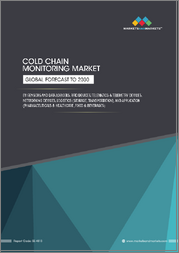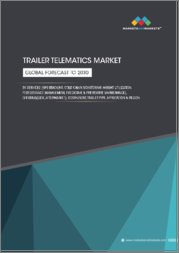
|
시장보고서
상품코드
1678028
콜드체인 모니터링 시장 규모, 점유율, 성장 분석 : 온도 유형별, 제공별, 물류별, 용도별, 지역별 - 산업 예측(2025-2032년)Cold Chain Monitoring Market Size, Share, and Growth Analysis, By Temperature Type (Frozen, Chilled), By Offering (Hardware, Software), By Logistics, By Application, By Region - Industry Forecast 2025-2032 |
||||||
콜드체인 모니터링 시장 규모는 2023년에 284억 8,000만 달러, 예측 기간(2025-2032년)의 CAGR은 22.4%로, 2024년 348억 6,000만 달러에서 2032년에는 1,756억 2,000만 달러로 성장할 전망입니다.
2023년 10월 현재, 콜드체인 모니터링 솔루션 시장은 온도에 민감한 의약품의 보관 및 배송에 대한 정부의 엄격한 규제로 인해 강력한 성장세를 보이고 있습니다. 냉장 창고 인프라에 대한 민간 및 정부의 투자 증가는 식품 및 기타 신선 식품의 부패를 최소화하기 위한 것입니다. 효과적인 온도 모니터링 기술의 필요성은 운송 중 제품 품질을 유지하기 위해 가장 중요합니다. 또한 무선 주파수 식별(RFID)과 사물인터넷(IoT)의 발전은 특히 신흥 경제국에서 시장 개발을 촉진하고 있습니다. 신선식품에 대한 수요와 미국 식품의약국(FDA) 및 유럽의약품청(EMA)과 같은 기관의 엄격한 규제 준수는 신뢰할 수 있는 콜드체인 모니터링 솔루션의 중요한 필요성을 더욱 강조하며 업계의 성장 전망을 높이고 있습니다.
목차
서론
- 조사의 목적
- 조사 범위
- 정의
조사 방법
- 정보 조달
- 2차와 1차 데이터 방법
- 시장 규모 예측
- 시장의 전제조건과 제한
개요
- 세계 시장 전망
- 공급과 수요 동향 분석
- 부문별 기회 분석
시장 역학과 전망
- 시장 개요
- 시장 규모
- 시장 역학
- 촉진요인과 기회
- 억제요인과 과제
- Porter의 산업 분석
주요 시장 인사이트
- 주요 성공 요인
- 경쟁의 정도
- 주요 투자 기회
- 시장 에코시스템
- 시장의 매력 지수(2024년)
- PESTEL 분석
- 거시경제 지표
- 밸류체인 분석
- 가격 분석
- 기술의 진보
- 사례 연구
콜드체인 모니터링 시장 규모 : 온도 유형별
- 시장 개요
- 냉동
- 냉장
콜드체인 모니터링 시장 규모 : 제공별
- 시장 개요
- 하드웨어
- 센서
- RFID 디바이스
- 텔레매틱스
- 네트워크 디바이스
- 기타
- 소프트웨어
- 온프레미스
- 클라우드 기반
콜드체인 모니터링 시장 규모 : 물류별
- 시장 개요
- 스토리지
- 창고
- 냉장 컨테이너
- 급속냉동기
- 교통기관
- 항공
- 수로
- 도로
- 철도
콜드체인 모니터링 시장 규모 : 용도별
- 시장 개요
- 식품 및 음료
- 과일과 채소
- 과육 및 농축물
- 유제품
- 우유
- 버터
- 치즈
- 아이스크림
- 기타
- 어류, 육류, 씨푸드
- 가공식품
- 베이커리 & 제과
- 기타
- 의약품
- 백신
- 혈액은행
- 기타
- 기타
콜드체인 모니터링 시장 규모
- 북미
- 미국
- 캐나다
- 유럽
- 독일
- 스페인
- 프랑스
- 영국
- 이탈리아
- 기타 유럽 지역
- 아시아태평양
- 중국
- 인도
- 일본
- 한국
- 기타 아시아태평양
- 라틴아메리카
- 브라질
- 기타 라틴아메리카 지역
- 중동 및 아프리카
- GCC 국가
- 남아프리카공화국
- 기타 중동 및 아프리카
경쟁 정보
- 상위 5사의 비교
- 주요 기업의 시장 포지셔닝(2024년)
- 주요 시장 기업이 채택한 전략
- 최근 시장 동향
- 기업의 시장 점유율 분석(2024년)
- 주요 기업의 기업 개요
- 기업의 상세
- 제품 포트폴리오 분석
- 기업의 부문별 점유율 분석
- 매출의 전년대비 비교(2022-2024)
주요 기업 개요
- Testo SE & Co. KGaA(Germany)
- Rotronic(Switzerland)
- ELPRO-BUCHS AG(Switzerland)
- Emerson(USA)
- Nietzsche Enterprise(Taiwan)
- Signatrol(United Kingdom)
- Haier Biomedical(China)
- Monnit Corporation(USA)
- Cold Chain Technologies(USA)
- Berlinger & Co. AG(Switzerland)
- DeltaTrak Inc.(USA)
- Roambee Corporation(USA)
- Omega Engineering, Inc.(USA)
- TempSen Electronics(China)
- Thermo Electric Company, Inc.(USA)
- Shandong Renke Control Technology Co., Ltd.(China)
결론과 제안
KSA 25.04.24Cold Chain Monitoring Market size was valued at USD 28.48 billion in 2023 and is poised to grow from USD 34.86 billion in 2024 to USD 175.62 billion by 2032, growing at a CAGR of 22.4% during the forecast period (2025-2032).
As of October 2023, the cold chain monitoring solutions market is experiencing robust growth driven by stringent government regulations on the storage and shipment of temperature-sensitive pharmaceutical products. Increased investments from both private and governmental sectors in refrigerated warehouse infrastructure aim to minimize spoilage of food and other perishable goods. The necessity for effective temperature monitoring technologies is paramount for maintaining product quality during transport. Additionally, advancements in radio frequency identification (RFID) and the Internet of Things (IoT) are propelling market expansion, particularly in developing economies. The demand for perishable items and strict regulatory compliance by agencies such as the FDA and EMA further underscore the critical need for reliable cold chain monitoring solutions, enhancing prospects for industry growth.
Top-down and bottom-up approaches were used to estimate and validate the size of the Cold Chain Monitoring market and to estimate the size of various other dependent submarkets. The research methodology used to estimate the market size includes the following details: The key players in the market were identified through secondary research, and their market shares in the respective regions were determined through primary and secondary research. This entire procedure includes the study of the annual and financial reports of the top market players and extensive interviews for key insights from industry leaders such as CEOs, VPs, directors, and marketing executives. All percentage shares split, and breakdowns were determined using secondary sources and verified through Primary sources. All possible parameters that affect the markets covered in this research study have been accounted for, viewed in extensive detail, verified through primary research, and analyzed to get the final quantitative and qualitative data.
Cold Chain Monitoring Market Segments Analysis
Global Cold Chain Monitoring Market is segmented by Temperature Type, Offering, Logistics, Application and region. Based on Temperature Type, the market is segmented into Frozen and Chilled. Based on Offering, the market is segmented into Hardware and Software. Based on Logistics, the market is segmented into Storage and Transportation. Based on Application, the market is segmented into Food & Beverages, Pharmaceuticals and Others. Based on region, the market is segmented into North America, Europe, Asia Pacific, Latin America and Middle East & Africa.
Driver of the Cold Chain Monitoring Market
The Cold Chain Monitoring market is experiencing significant growth driven by the rising demand for fresh food and beverages, as consumers increasingly prioritize health and quality. This trend is particularly evident among the working population in countries like China, where interest in nutritious options is elevating market potential. As customers seek premium products, such as Alaskan salmon, which require rapid transportation over long distances to ensure optimal freshness and quality, effective temperature management becomes crucial. Maintaining appropriate temperatures prevents deterioration in texture and taste, underscoring the necessity of robust cold chain monitoring solutions in the supply chain.
Restraints in the Cold Chain Monitoring Market
Despite the significant expansion of the cold chain monitoring market, one major constraint is the considerable cost associated with monitoring equipment, particularly in developing nations. The sophisticated monitoring systems, including IoT-based sensors, RFID tags, real-time tracking devices, and cloud analytics, require a substantial initial investment. Additionally, the financial burden of establishing the necessary temperature-controlled storage and transportation infrastructure, coupled with these advanced monitoring tools, poses a challenge. This high expenditure can hinder the adoption of effective cold chain solutions, particularly in regions where financial resources are limited, thus impacting overall market growth.
Market Trends of the Cold Chain Monitoring Market
The Cold Chain Monitoring market is experiencing significant growth driven by the rising popularity of temperature-sensitive products, especially within the pharmaceutical and food & beverage sectors. The increasing reliance on biologics, vaccines, and perishable medications in healthcare necessitates stringent temperature management to ensure product efficacy and safety, prompting the implementation of advanced tracking and monitoring systems. Concurrently, the growing consumer awareness about food quality and safety is propelling demand for improved cold chain solutions in the food industry. As regulatory pressures intensify and global trade expands, robust cold chain monitoring technologies are becoming indispensable, paving the way for innovative market solutions and opportunities.
Table of Contents
Introduction
- Objectives of the Study
- Scope of the Report
- Definitions
Research Methodology
- Information Procurement
- Secondary & Primary Data Methods
- Market Size Estimation
- Market Assumptions & Limitations
Executive Summary
- Global Market Outlook
- Supply & Demand Trend Analysis
- Segmental Opportunity Analysis
Market Dynamics & Outlook
- Market Overview
- Market Size
- Market Dynamics
- Drivers & Opportunities
- Restraints & Challenges
- Porters Analysis
- Competitive rivalry
- Threat of substitute
- Bargaining power of buyers
- Threat of new entrants
- Bargaining power of suppliers
Key Market Insights
- Key Success Factors
- Degree of Competition
- Top Investment Pockets
- Market Ecosystem
- Market Attractiveness Index, 2024
- PESTEL Analysis
- Macro-Economic Indicators
- Value Chain Analysis
- Pricing Analysis
- Technological Advancement
- Case Studies
Global Cold Chain Monitoring Market Size by Temperature Type & CAGR (2025-2032)
- Market Overview
- Frozen
- Chilled
Global Cold Chain Monitoring Market Size by Offering & CAGR (2025-2032)
- Market Overview
- Hardware
- Sensors
- RFID Devices
- Telematics
- Networking Devices
- Others
- Software
- On-premise
- Cloud-based
Global Cold Chain Monitoring Market Size by Logistics & CAGR (2025-2032)
- Market Overview
- Storage
- Warehouses
- Cold Containers
- Blast Freezers
- Transportation
- Airways
- Waterways
- Roadways
- Railways
Global Cold Chain Monitoring Market Size by Application & CAGR (2025-2032)
- Market Overview
- Food & Beverages
- Fruits & Vegetables
- Fruit Pulp & Concentrates
- Dairy Products
- Milk
- Butter
- Cheese
- Ice cream
- Others
- Fish, Meat, and Seafood
- Processed Food
- Bakery & Confectionary
- Others
- Pharmaceuticals
- Vaccines
- Blood Banking
- Others
- Others
Global Cold Chain Monitoring Market Size & CAGR (2025-2032)
- North America (Temperature Type, Offering, Logistics, Application)
- US
- Canada
- Europe (Temperature Type, Offering, Logistics, Application)
- Germany
- Spain
- France
- UK
- Italy
- Rest of Europe
- Asia Pacific (Temperature Type, Offering, Logistics, Application)
- China
- India
- Japan
- South Korea
- Rest of Asia-Pacific
- Latin America (Temperature Type, Offering, Logistics, Application)
- Brazil
- Rest of Latin America
- Middle East & Africa (Temperature Type, Offering, Logistics, Application)
- GCC Countries
- South Africa
- Rest of Middle East & Africa
Competitive Intelligence
- Top 5 Player Comparison
- Market Positioning of Key Players, 2024
- Strategies Adopted by Key Market Players
- Recent Developments in the Market
- Company Market Share Analysis, 2024
- Company Profiles of All Key Players
- Company Details
- Product Portfolio Analysis
- Company's Segmental Share Analysis
- Revenue Y-O-Y Comparison (2022-2024)
Key Company Profiles
- Testo SE & Co. KGaA (Germany)
- Company Overview
- Business Segment Overview
- Financial Updates
- Key Developments
- Rotronic (Switzerland)
- Company Overview
- Business Segment Overview
- Financial Updates
- Key Developments
- ELPRO-BUCHS AG (Switzerland)
- Company Overview
- Business Segment Overview
- Financial Updates
- Key Developments
- Emerson (USA)
- Company Overview
- Business Segment Overview
- Financial Updates
- Key Developments
- Nietzsche Enterprise (Taiwan)
- Company Overview
- Business Segment Overview
- Financial Updates
- Key Developments
- Signatrol (United Kingdom)
- Company Overview
- Business Segment Overview
- Financial Updates
- Key Developments
- Haier Biomedical (China)
- Company Overview
- Business Segment Overview
- Financial Updates
- Key Developments
- Monnit Corporation (USA)
- Company Overview
- Business Segment Overview
- Financial Updates
- Key Developments
- Cold Chain Technologies (USA)
- Company Overview
- Business Segment Overview
- Financial Updates
- Key Developments
- Berlinger & Co. AG (Switzerland)
- Company Overview
- Business Segment Overview
- Financial Updates
- Key Developments
- DeltaTrak Inc. (USA)
- Company Overview
- Business Segment Overview
- Financial Updates
- Key Developments
- Roambee Corporation (USA)
- Company Overview
- Business Segment Overview
- Financial Updates
- Key Developments
- Omega Engineering, Inc. (USA)
- Company Overview
- Business Segment Overview
- Financial Updates
- Key Developments
- TempSen Electronics (China)
- Company Overview
- Business Segment Overview
- Financial Updates
- Key Developments
- Thermo Electric Company, Inc. (USA)
- Company Overview
- Business Segment Overview
- Financial Updates
- Key Developments
- Shandong Renke Control Technology Co., Ltd. (China)
- Company Overview
- Business Segment Overview
- Financial Updates
- Key Developments



















